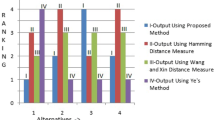Abstract
In this paper, we introduce a quantity measure which is called (R, S)-norm entropy and discuss some of its major properties with Shannon’s and other entropies in the literature. Based on this (R, S)-norm entropy, we have proposed a new (R, S)-norm fuzzy information measure and discussed its validity and properties. Further, we have given its comparison with other fuzzy information measures to prove its effectiveness. Attribute weights play an important role in multiple-attribute decision-making problems. In the present communication, two methods of determining the attribute weights are introduced. First is the case when the information regarding attribute weights is incompletely known or completely unknown and second is when we have partial information about attribute weights. For the first case, the extension of ordinary entropy weight method is used to calculate attribute weights and minimum entropy principle method based on solving a linear programming model is used in the second case. Finally, two methods are explained through numerical examples.
Similar content being viewed by others
References
Aczel J, Daroczy Z (1975) On measures of information and their characterization. Academic Press, New York
Boekee DE, Vander Lubbe JCA (1980) The R-norm information measure. Inf Control 45:136–155
Bhandari D, Pal NR (1993) Some new information measures for fuzzy sets. Inf Sci 67(3):204–228
Bloch I (2015) Fuzzy sets for image processing and understanding. Fuzzy Sets Syst 281:280–291
De Luca A, Termini S (1972) A definition of a non-probabilistic entropy in the setting of fuzzy sets theory. Inf Control 20:301–312
De SK, Biswas R, Roy AR (2000) Some operations on intuitionistic fuzzy sets. Fuzzy Sets Syst 114:477–484
Ebanks BR (1983) On measure of fuzziness and their representation. J Math Anal Appl 94:301–312
Ekel PY (2002) Fuzzy sets and methods of decision making. Comput Math Appl 44(7):863–875
Güneralpa B, Gertnera G, Mendozaa G, Anderson A (2007) Evaluating probabilistic data with a possibilistic criterian in land-restoration decision-making: effects on the precision of results. Fuzzy Sets Syst 158:1546–1560
Havdra JH, Charvat F (1967) Quantification method classification process: concept of structral \(\alpha \)-entropy. Kybernetika 3:30–35
Hooda DS (2004) On generalized measures of fuzzy entropy. Math Slov 54:315–325
Hwang CH, Yang MS (2008) On entropy of fuzzy sets. Int J Uncertainty Fuzziness Knowl-Based Syst 16:519–527
Higashi M, Klir GJ (1982) On measures of fuzziness and fuzzy complements. Int J Gen Syst 8:169–180
Hung WL, Yang MS (2006) Fuzzy entropy on intuitionistic fuzzy sets. Int J Intell Syst 21:443–451
Joshi R, Kumar S (2016a) \((R, S)\)-norm information measure and a relation between coding and questionnaire theory. Open Syst Inf Dyn 23(3):1–12
Joshi R, Kumar S (2016b) A new approach in multiple attribute decision making using \(R\)-norm entropy and Hamming distance measure. Int J Inf Manag Sci 27(3):253–268
Joshi R, Kumar S (2017a) A new intuitionistic fuzzy entropy of order-\(\alpha \) with applications in multiple attribute decision making. Adv Intell Syst Comput 546:212–219
Joshi R, Kumar S (2017b) A new exponential fuzzy entropy of order \((\alpha, \beta )\) and its application in multiple attribute decision-making problems. Commun Math Stat 5:213–229
Joshi R, Kumar S (2017c) Parametric \((R, S)\)-norm entropy on intuitionistic fuzzy sets with a new approach in multiple attribute decision making. Fuzzy Inf Eng 9:181–203
Kullback S, Leibler RA (1951) On information and sufficiency. Ann Math Stat 22:79–86
Kapur JN (1997) Measures of fuzzy information. Mathematical Science Trust Society, New Delhi
Kaufman A (1980) Fuzzy subsets: fundamental theoretical elements, vol 3. Academic Press, New York
Kosko B (1986) Fuzzy entropy and conditioning. Inf Sci 40(2):165–174
Li P, Liu B (2008) Entropy of credibility distributions for fuzzy variables. IEEE Trans Fuzzy Syst 16:123–129
Liu M, Ren H (2014) A new intuitionistic fuzzy entropy and application in multi-attribute decision-making. Information 5:587–601
Pal NR, Pal SK (1989) Object background segmentation using new definition of entropy. Proc Inst Electron Eng 136:284–295
Pal NR, Pal SR (1992) Higher order fuzzy entropy and hybrid entropy of a set. Inf Sci 61(3):211–231
Pedrycz W (1997) Fuzzy sets in pattern recognition: accomplishments and challenges. Fuzzy Sets Syst 90(2):171–176
Renyi A (1961) On measures of entropy and information. In: Proceedings of the 4th Barkley symposium on Mathemtaical statistics and probability, vol 1. University of California Press, p 547
Ramze R, Goedhart B, Lelieveldt BPF, Reiber JHC (1999) Fuzzy feature selection. Pattern Recognit 32(12):2011–2019
Shannon CE (1948) A mathematical theory of communication. Bell Syst Tech J 27(378–423):623–656
Tsalli C (1988) Possible generalization of Boltzman–Gibbs statistics. J Stat Phys 52:480–487
Torres A, Nieto JJ (2006) Fuzzy logic in medicines and bioinformatics. J Biomed Bio-Technol 2006:1–7
Taneja IJ (1975) A study of generalized measures of information theory. Ph.D. thesis, University of Delhi
Verma R, Sharma BD (2011) On generalized exponential fuzzy entropy. World Acad Sci Eng Technol 60:1402–1405
Verma R, Sharma BD (2014) On intuitionistic fuzzy entropy of order-\(\alpha \). Adv Fuzzy Syst 2014:1–8 (article ID 789890)
Wang J, Wang P (2012) Intutionistic linguistic fuzzy multi-criteria decision-making method based on intutionistic fuzzy entropy. Control Decis 27:1694–1698
Xia M, Xu Z (2012) Entropy/cross entropy-based group decision making under intuitionistic fuzzy environment. Inf Fusion 13:31–47
Yager RR (1979) On the measure of fuzziness and negation. Part 1: membership in the unit interval. Int J Gen Syst 5:221–229
Zadeh LA (1965) Fuzzy sets. Inf Control 8:221–229
Zadeh LA (1968) Probability measures of fuzzy events. J Math Anal Appl 23:421–427
Acknowledgements
The authors are thankful to anonymous referees for their valuable comments and suggestions to improve this manuscript.
Author information
Authors and Affiliations
Corresponding author
Additional information
Communicated by Rosana Sueli da Motta Jafelice.
Rights and permissions
About this article
Cite this article
Joshi, R., Kumar, S. An (R, S)-norm fuzzy information measure with its applications in multiple-attribute decision-making. Comp. Appl. Math. 37, 2943–2964 (2018). https://doi.org/10.1007/s40314-017-0491-4
Received:
Revised:
Accepted:
Published:
Issue Date:
DOI: https://doi.org/10.1007/s40314-017-0491-4
Keywords
- R-norm entropy
- Shannon’s entropy
- Convex and concave function
- (R, S)-norm information measure
- (R, S)-norm fuzzy information measure
- MADM




